应对全球变暖英语作文
- 格式:wps
- 大小:11.00 KB
- 文档页数:1
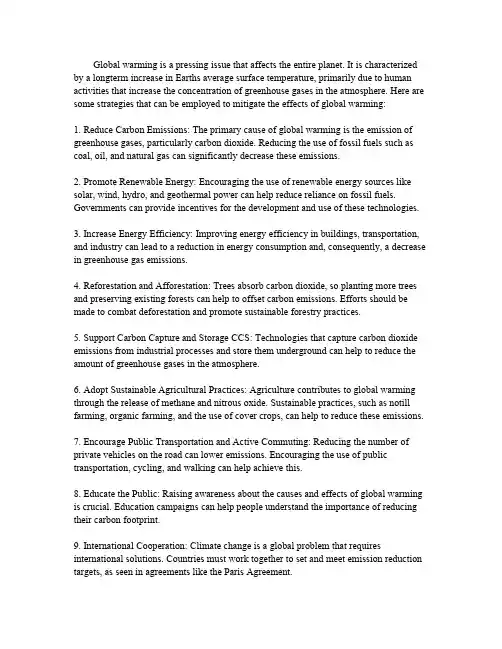
Global warming is a pressing issue that affects the entire planet.It is characterized by a longterm increase in Earths average surface temperature,primarily due to human activities that increase the concentration of greenhouse gases in the atmosphere.Here are some strategies that can be employed to mitigate the effects of global warming:1.Reduce Carbon Emissions:The primary cause of global warming is the emission of greenhouse gases,particularly carbon dioxide.Reducing the use of fossil fuels such as coal,oil,and natural gas can significantly decrease these emissions.2.Promote Renewable Energy:Encouraging the use of renewable energy sources like solar,wind,hydro,and geothermal power can help reduce reliance on fossil fuels. Governments can provide incentives for the development and use of these technologies.3.Increase Energy Efficiency:Improving energy efficiency in buildings,transportation, and industry can lead to a reduction in energy consumption and,consequently,a decrease in greenhouse gas emissions.4.Reforestation and Afforestation:Trees absorb carbon dioxide,so planting more trees and preserving existing forests can help to offset carbon emissions.Efforts should be made to combat deforestation and promote sustainable forestry practices.5.Support Carbon Capture and Storage CCS:Technologies that capture carbon dioxide emissions from industrial processes and store them underground can help to reduce the amount of greenhouse gases in the atmosphere.6.Adopt Sustainable Agricultural Practices:Agriculture contributes to global warming through the release of methane and nitrous oxide.Sustainable practices,such as notill farming,organic farming,and the use of cover crops,can help to reduce these emissions.7.Encourage Public Transportation and Active Commuting:Reducing the number of private vehicles on the road can lower emissions.Encouraging the use of public transportation,cycling,and walking can help achieve this.cate the Public:Raising awareness about the causes and effects of global warming is cation campaigns can help people understand the importance of reducing their carbon footprint.9.International Cooperation:Climate change is a global problem that requires international solutions.Countries must work together to set and meet emission reduction targets,as seen in agreements like the Paris Agreement.10.Innovate and Invest in Green Technologies:Supporting research and development in green technologies can lead to breakthroughs that make it easier to reduce emissions and adapt to the effects of global warming.In conclusion,addressing global warming requires a multifaceted approach that includes policy changes,technological advancements,and individual actions.By working together, we can take steps to slow down and eventually reverse the trend of global warming.。
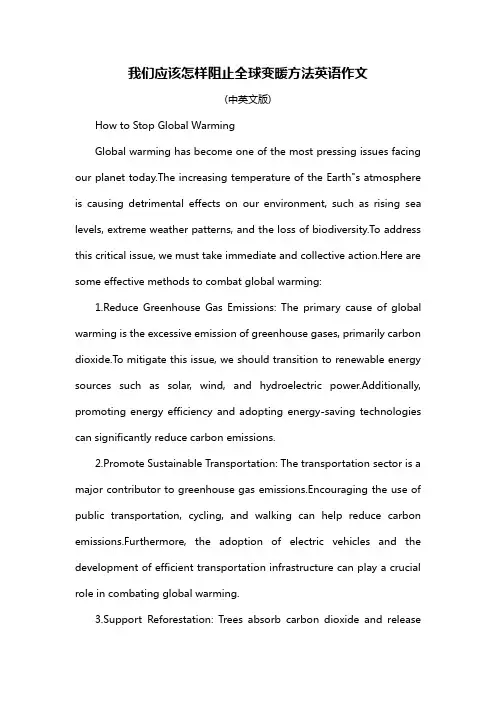
我们应该怎样阻止全球变暖方法英语作文(中英文版)How to Stop Global WarmingGlobal warming has become one of the most pressing issues facing our planet today.The increasing temperature of the Earth"s atmosphere is causing detrimental effects on our environment, such as rising sea levels, extreme weather patterns, and the loss of biodiversity.To address this critical issue, we must take immediate and collective action.Here are some effective methods to combat global warming:1.Reduce Greenhouse Gas Emissions: The primary cause of global warming is the excessive emission of greenhouse gases, primarily carbon dioxide.To mitigate this issue, we should transition to renewable energy sources such as solar, wind, and hydroelectric power.Additionally, promoting energy efficiency and adopting energy-saving technologies can significantly reduce carbon emissions.2.Promote Sustainable Transportation: The transportation sector is a major contributor to greenhouse gas emissions.Encouraging the use of public transportation, cycling, and walking can help reduce carbon emissions.Furthermore, the adoption of electric vehicles and the development of efficient transportation infrastructure can play a crucial role in combating global warming.3.Support Reforestation: Trees absorb carbon dioxide and releaseoxygen, acting as natural carbon sinks.Supporting reforestation efforts by planting trees can help sequester carbon and combat deforestation.Protecting existing forests and implementing sustainable logging practices are also essential in preserving these vital ecosystems.4.Implement Sustainable Agricultural Practices: Agriculture is another significant source of greenhouse gas emissions.Adopting sustainable farming practices, such as organic farming, precision agriculture, and crop rotation, can reduce emissions and promote soil health.Furthermore, reducing food waste and adopting a more plant-based diet can significantly decrease the environmental impact of the agricultural sector.5.Raise Awareness and Educate: Educating individuals about the causes and consequences of global warming is crucial for driving change.By raising awareness, we can encourage people to make sustainable choices in their daily lives, such as reducing energy consumption, recycling, and supporting eco-friendly products and companies.6.Policy and International Cooperation: Governments play a vital role in addressing global warming.Implementing policies that limit carbon emissions, promoting international agreements like the Paris Agreement, and providing incentives for sustainable practices are essential steps in the fight against global warming.In conclusion, stopping global warming requires a comprehensive and multi-faceted approach.By reducing greenhouse gas emissions, promoting sustainable practices, raising awareness, and fostering international cooperation, we can work towards a healthier and more sustainable future for our planet.我们应该如何阻止全球变暖全球变暖已成为当今我们星球面临的最紧迫问题之一。
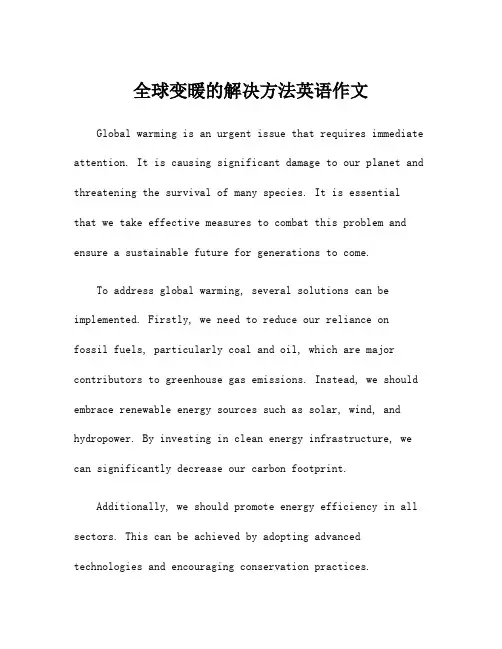
全球变暖的解决方法英语作文Global warming is an urgent issue that requires immediate attention. It is causing significant damage to our planet and threatening the survival of many species. It is essentialthat we take effective measures to combat this problem and ensure a sustainable future for generations to come.To address global warming, several solutions can be implemented. Firstly, we need to reduce our reliance onfossil fuels, particularly coal and oil, which are major contributors to greenhouse gas emissions. Instead, we should embrace renewable energy sources such as solar, wind, and hydropower. By investing in clean energy infrastructure, we can significantly decrease our carbon footprint.Additionally, we should promote energy efficiency in all sectors. This can be achieved by adopting advanced technologies and encouraging conservation practices.Governments should introduce stricter regulations and provide incentives for industries to improve their energy efficiency standards. Individuals should also be educated about the importance of energy conservation and encouraged to make sustainable choices in their daily lives.Furthermore, deforestation contributes to global warming by releasing stored carbon dioxide into the atmosphere. To counter this, we must focus on preserving existing forests and undertaking reforestation initiatives. Trees play a vital role in absorbing carbon dioxide and releasing oxygen, thus acting as natural carbon sinks. By implementing sustainable forestry practices and protecting natural habitats, we can mitigate the effects of global warming.Moreover, it is crucial to raise awareness about global warming and its consequences. Education campaigns, public forums, and media outlets should highlight the importance of taking action to combat climate change. By fostering a senseof responsibility and encouraging collective efforts, we can mobilize communities, businesses, and governments to prioritize environmental conservation.In conclusion, addressing global warming requires a multifaceted approach. We must transition to cleaner energy sources, improve energy efficiency, preserve and restore forests, and raise awareness about the issue. It is only through collective action and international cooperation that we can effectively combat global warming and secure a sustainable future for our planet.。
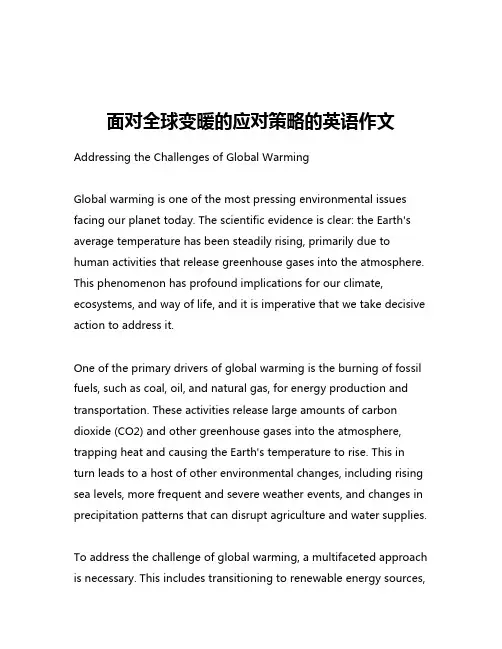
面对全球变暖的应对策略的英语作文Addressing the Challenges of Global WarmingGlobal warming is one of the most pressing environmental issues facing our planet today. The scientific evidence is clear: the Earth's average temperature has been steadily rising, primarily due to human activities that release greenhouse gases into the atmosphere. This phenomenon has profound implications for our climate, ecosystems, and way of life, and it is imperative that we take decisive action to address it.One of the primary drivers of global warming is the burning of fossil fuels, such as coal, oil, and natural gas, for energy production and transportation. These activities release large amounts of carbon dioxide (CO2) and other greenhouse gases into the atmosphere, trapping heat and causing the Earth's temperature to rise. This in turn leads to a host of other environmental changes, including rising sea levels, more frequent and severe weather events, and changes in precipitation patterns that can disrupt agriculture and water supplies.To address the challenge of global warming, a multifaceted approach is necessary. This includes transitioning to renewable energy sources,such as solar, wind, and hydropower, which produce little to no greenhouse gas emissions. Governments, businesses, and individuals can all play a role in this transition by investing in and adopting these technologies, as well as implementing policies and practices that incentivize their use.Another key strategy is improving energy efficiency across all sectors of the economy. This can involve measures such as upgrading buildings to be more energy-efficient, developing more fuel-efficient vehicles, and implementing more efficient industrial processes. By reducing the overall demand for energy, we can lower greenhouse gas emissions and mitigate the impact of global warming.Afforestation and reforestation efforts are also crucial in the fight against global warming. Trees and other plants absorb CO2 from the atmosphere and store it in their biomass, effectively acting as natural carbon sinks. By planting more trees and restoring degraded forests, we can help to offset some of the greenhouse gas emissions that are contributing to climate change.Additionally, individual actions can make a significant difference. Simple lifestyle changes, such as reducing energy consumption, adopting more sustainable transportation options, and reducing waste, can all contribute to the overall effort to address global warming. By raising awareness and encouraging widespreadparticipation, we can empower individuals to take meaningful steps towards a more sustainable future.Ultimately, addressing the challenge of global warming will require a coordinated, global effort involving governments, businesses, and individuals. It will require significant investments in new technologies, changes in policies and practices, and a fundamental shift in our collective mindset and behavior. However, the consequences of inaction are dire, and the time to act is now.By taking decisive steps to reduce greenhouse gas emissions, promote renewable energy, improve energy efficiency, and protect and restore natural ecosystems, we can work towards a more sustainable and resilient future for our planet and all its inhabitants. The stakes are high, but the potential rewards are even greater – a healthier, more livable world for generations to come.。
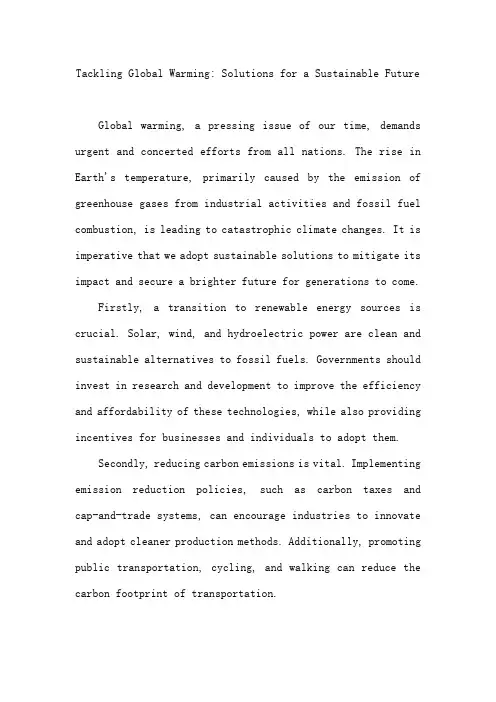
Tackling Global Warming: Solutions for a Sustainable FutureGlobal warming, a pressing issue of our time, demands urgent and concerted efforts from all nations. The rise in Earth's temperature, primarily caused by the emission of greenhouse gases from industrial activities and fossil fuel combustion, is leading to catastrophic climate changes. It is imperative that we adopt sustainable solutions to mitigate its impact and secure a brighter future for generations to come.Firstly, a transition to renewable energy sources is crucial. Solar, wind, and hydroelectric power are clean and sustainable alternatives to fossil fuels. Governments should invest in research and development to improve the efficiency and affordability of these technologies, while also providing incentives for businesses and individuals to adopt them.Secondly, reducing carbon emissions is vital. Implementing emission reduction policies, such as carbon taxes and cap-and-trade systems, can encourage industries to innovate and adopt cleaner production methods. Additionally, promoting public transportation, cycling, and walking can reduce the carbon footprint of transportation.Moreover, afforestation and reforestation efforts are essential. Trees absorb carbon dioxide and release oxygen, helping to offset greenhouse gas emissions. Initiatives like planting millions of trees and protecting existing forests should be scaled up globally.Lastly, education and awareness are key. Educating the public about the causes and consequences of global warming, as well as the importance of sustainable living, is essential. Governments and organizations should organize campaigns and workshops to raise awareness and encourage individuals to make eco-friendly choices in their daily lives.In conclusion, tackling global warming requires a multifaceted approach involving policy changes, technological advancements, and societal shifts. It is a collective responsibility that demands cooperation and commitment from all nations. By working together, we can ensure a healthier, safer, and more sustainable planet for future generations.。
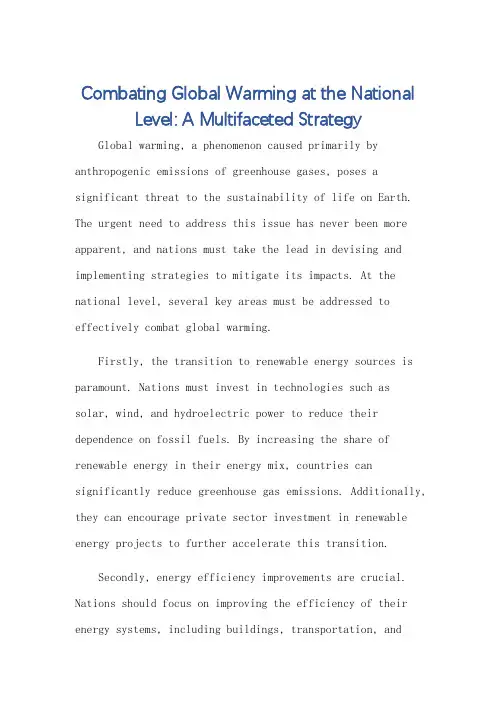
Combating Global Warming at the National Level: A Multifaceted StrategyGlobal warming, a phenomenon caused primarily by anthropogenic emissions of greenhouse gases, poses a significant threat to the sustainability of life on Earth. The urgent need to address this issue has never been more apparent, and nations must take the lead in devising and implementing strategies to mitigate its impacts. At the national level, several key areas must be addressed to effectively combat global warming.Firstly, the transition to renewable energy sources is paramount. Nations must invest in technologies such as solar, wind, and hydroelectric power to reduce their dependence on fossil fuels. By increasing the share of renewable energy in their energy mix, countries can significantly reduce greenhouse gas emissions. Additionally, they can encourage private sector investment in renewable energy projects to further accelerate this transition.Secondly, energy efficiency improvements are crucial. Nations should focus on improving the efficiency of their energy systems, including buildings, transportation, andindustrial processes. By using energy more efficiently, countries can reduce their overall energy consumption and subsequent greenhouse gas emissions. This can be achieved through policies such as energy efficiency standards and incentives for energy-efficient technologies.Thirdly, the promotion of sustainable land use and forestry practices is essential. Deforestation and land conversion are significant contributors to global warming. Nations must adopt policies that promote the conservation and restoration of forests, as well as sustainable land use practices. This includes limiting deforestation, promoting afforestation and reforestation programs, and enhancing the sustainability of agricultural practices.Fourthly, the development and implementation ofclimate-smart policies are vital. Nations should prioritize policies that adapt to and mitigate the impacts of climate change. This includes policies that promote resilience to extreme weather events, support sustainable urban planning, and encourage the development of low-carbon economies. Additionally, countries should strengthen theirinstitutions and governance frameworks to ensure the effective implementation of these policies.Lastly, international cooperation is fundamental in addressing global warming. Nations must work together to share knowledge, technologies, and resources to combat climate change. They should also support the development of international agreements and treaties that promote global action on climate change, such as the Paris Agreement.In conclusion, addressing global warming at thenational level requires a multifaceted strategy that encompasses the transition to renewable energy, energy efficiency improvements, sustainable land use and forestry practices, climate-smart policies, and international cooperation. By prioritizing these areas and implementing effective strategies, nations can make significant contributions to mitigating the impacts of global warming and securing a sustainable future for all.**国家层面解决全球变暖问题的多层面策略**全球变暖,这一主要由人为排放温室气体引起的现象,对地球上生命的可持续性构成了巨大威胁。
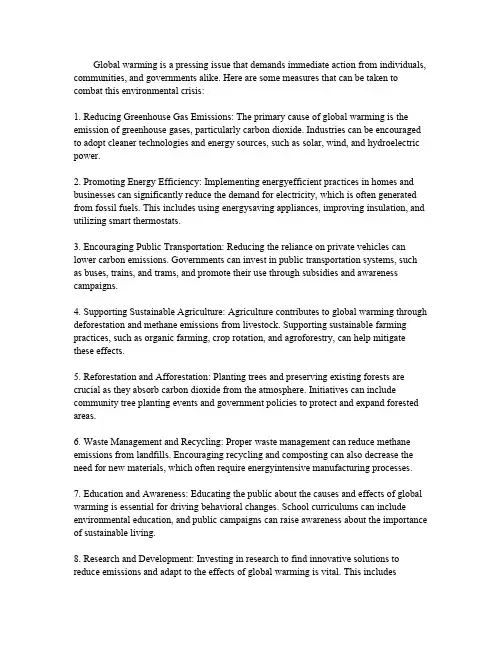
Global warming is a pressing issue that demands immediate action from individuals, communities,and governments alike.Here are some measures that can be taken to combat this environmental crisis:1.Reducing Greenhouse Gas Emissions:The primary cause of global warming is the emission of greenhouse gases,particularly carbon dioxide.Industries can be encouraged to adopt cleaner technologies and energy sources,such as solar,wind,and hydroelectric power.2.Promoting Energy Efficiency:Implementing energyefficient practices in homes and businesses can significantly reduce the demand for electricity,which is often generated from fossil fuels.This includes using energysaving appliances,improving insulation,and utilizing smart thermostats.3.Encouraging Public Transportation:Reducing the reliance on private vehicles can lower carbon ernments can invest in public transportation systems,such as buses,trains,and trams,and promote their use through subsidies and awareness campaigns.4.Supporting Sustainable Agriculture:Agriculture contributes to global warming through deforestation and methane emissions from livestock.Supporting sustainable farming practices,such as organic farming,crop rotation,and agroforestry,can help mitigate these effects.5.Reforestation and Afforestation:Planting trees and preserving existing forests are crucial as they absorb carbon dioxide from the atmosphere.Initiatives can include community tree planting events and government policies to protect and expand forested areas.6.Waste Management and Recycling:Proper waste management can reduce methane emissions from landfills.Encouraging recycling and composting can also decrease the need for new materials,which often require energyintensive manufacturing processes.cation and Awareness:Educating the public about the causes and effects of global warming is essential for driving behavioral changes.School curriculums can include environmental education,and public campaigns can raise awareness about the importance of sustainable living.8.Research and Development:Investing in research to find innovative solutions to reduce emissions and adapt to the effects of global warming is vital.This includesdeveloping new materials,technologies,and methods for carbon capture and storage.9.International Cooperation:Global warming is a worldwide problem that requires a coordinated international response.Countries can work together to set emission reduction targets,share technology,and provide financial support for climate change mitigation and adaptation projects.10.Legislation and Policy:Governments can enact laws and policies to regulate emissions,promote renewable energy,and encourage sustainable practices.This may include carbon pricing,subsidies for green technologies,and stricter emission standards for industries.By implementing these measures,we can work towards slowing down the rate of global warming and mitigating its devastating effects on our planet.It is a collective effort that requires commitment and action from all sectors of society.。
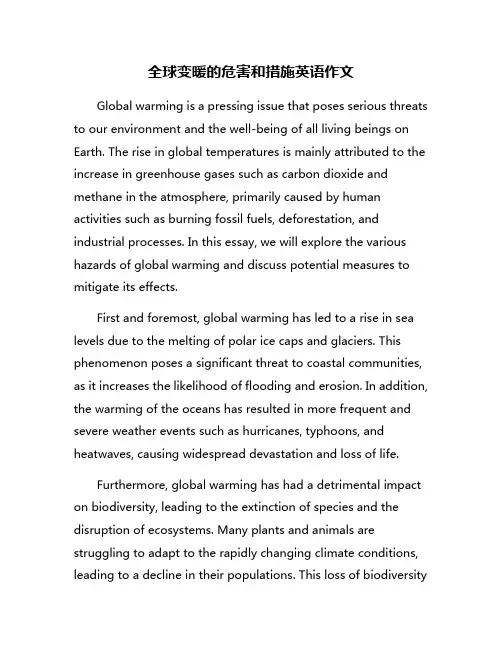
全球变暖的危害和措施英语作文Global warming is a pressing issue that poses serious threats to our environment and the well-being of all living beings on Earth. The rise in global temperatures is mainly attributed to the increase in greenhouse gases such as carbon dioxide and methane in the atmosphere, primarily caused by human activities such as burning fossil fuels, deforestation, and industrial processes. In this essay, we will explore the various hazards of global warming and discuss potential measures to mitigate its effects.First and foremost, global warming has led to a rise in sea levels due to the melting of polar ice caps and glaciers. This phenomenon poses a significant threat to coastal communities, as it increases the likelihood of flooding and erosion. In addition, the warming of the oceans has resulted in more frequent and severe weather events such as hurricanes, typhoons, and heatwaves, causing widespread devastation and loss of life.Furthermore, global warming has had a detrimental impact on biodiversity, leading to the extinction of species and the disruption of ecosystems. Many plants and animals are struggling to adapt to the rapidly changing climate conditions, leading to a decline in their populations. This loss of biodiversityhas far-reaching consequences for the stability of ecosystems and the health of our planet.In addition to environmental challenges, global warming also poses risks to human health. Rising temperatures can exacerbate air pollution and increase the spread of diseases such as malaria and dengue fever. Heatwaves also pose a direct threat to vulnerable populations, such as the elderly and children, who are more susceptible to heat-related illnesses.To address the hazards of global warming, it is imperative that we take immediate action to reduce greenhouse gas emissions and transition to renewable energy sources. One of the key measures is to reduce our reliance on fossil fuels by investing in clean energy technologies such as solar, wind, and hydropower. By transitioning to renewable energy sources, we can significantly reduce our carbon footprint and mitigate the effects of global warming.Another important measure is to promote sustainable practices in agriculture, forestry, and land use. By implementing sustainable farming techniques, protecting forests, and restoring degraded lands, we can help sequester carbon dioxide from the atmosphere and preserve biodiversity. It is also crucial to raiseawareness about the impacts of global warming and encourage individuals, businesses, and governments to take action.In conclusion, global warming presents a grave threat to our planet and requires urgent action to address its hazards. By implementing measures to reduce greenhouse gas emissions, transition to renewable energy sources, and promote sustainable practices, we can mitigate the effects of global warming and safeguard the future of our planet. It is imperative that we work together to combat this global challenge and create a more sustainable and resilient world for future generations.。
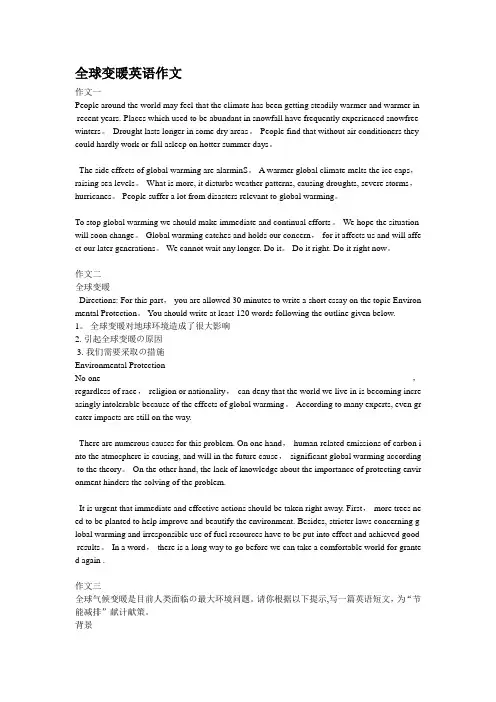
全球变暖英语作文 作文一 People around the world may feel that the climate has been getting steadily warmer and warmer in recent years. Places which used to be abundant in snowfall have frequently experienced snowfree winters。 Drought lasts longer in some dry areas。 People find that without air conditioners they could hardly work or fall asleep on hotter summer days。
The side effects of global warming are alarminS。 A warmer global climate melts the ice caps, raising sea levels。 What is more, it disturbs weather patterns, causing droughts, severe storms, hurricanes。 People suffer a lot from disasters relevant to global warming。
To stop global warming we should make immediate and continual efforts。 We hope the situation will soon change。 Global warming catches and holds our concern, for it affects us and will affect our later generations。 We cannot wait any longer. Do it。 Do it right. Do it right now。
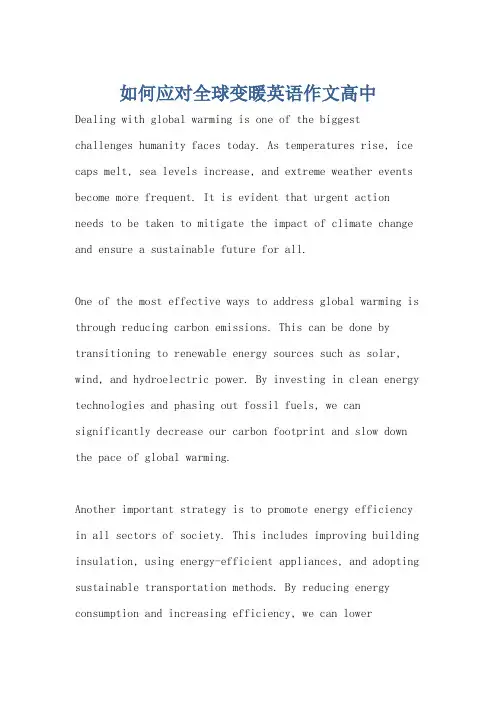
如何应对全球变暖英语作文高中Dealing with global warming is one of the biggest challenges humanity faces today. As temperatures rise, ice caps melt, sea levels increase, and extreme weather events become more frequent. It is evident that urgent action needs to be taken to mitigate the impact of climate change and ensure a sustainable future for all.One of the most effective ways to address global warming is through reducing carbon emissions. This can be done by transitioning to renewable energy sources such as solar, wind, and hydroelectric power. By investing in clean energy technologies and phasing out fossil fuels, we can significantly decrease our carbon footprint and slow down the pace of global warming.Another important strategy is to promote energy efficiency in all sectors of society. This includes improving building insulation, using energy-efficient appliances, and adopting sustainable transportation methods. By reducing energy consumption and increasing efficiency, we can lowergreenhouse gas emissions and lessen the impact of climate change.In addition to reducing carbon emissions, it is crucial to protect and restore natural ecosystems such as forests, wetlands, and oceans. These ecosystems play a vital role in sequestering carbon dioxide from the atmosphere and regulating the Earth's climate. By preserving biodiversity and restoring degraded landscapes, we can enhance nature's ability to mitigate the effects of global warming.Furthermore, education and awareness-raising are essential components of any effective response to climate change. By educating people about the causes and consequences of global warming, we can inspire individuals to take action in their daily lives. Encouraging sustainable practices such as recycling, conserving water, and supporting local agriculture can make a significant difference in reducing greenhouse gas emissions.Lastly, international cooperation is key to addressing global warming on a larger scale. Countries must cometogether to set ambitious emission reduction targets, share best practices, and provide financial support to developing nations facing the brunt of climate change impacts. Only through collective action can we hope to combat this existential threat effectively.In conclusion, dealing with global warming requires a comprehensive approach that addresses both mitigation and adaptation strategies. By reducing carbon emissions, promoting energy efficiency, protecting natural ecosystems, raising awareness, and fostering international cooperation, we can work towards a more sustainable future for all. The time to act is now - let us do our part in safeguarding our planet for future generations.。
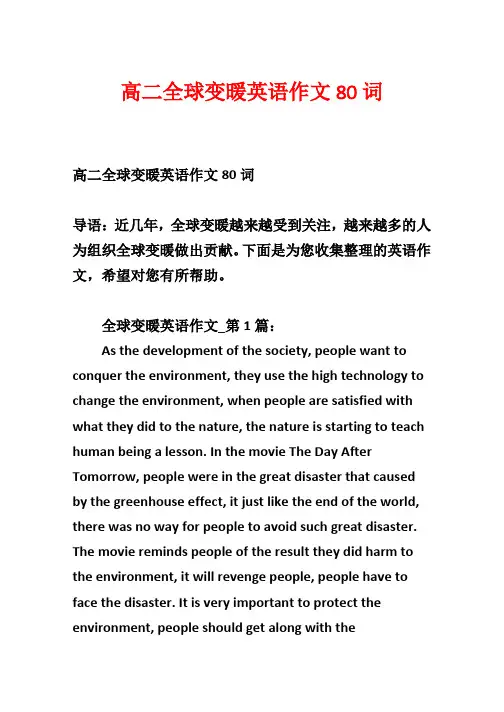
高二全球变暖英语作文80词高二全球变暖英语作文80词导语:近几年,全球变暖越来越受到关注,越来越多的人为组织全球变暖做出贡献。
下面是为您收集整理的英语作文,希望对您有所帮助。
全球变暖英语作文_第1篇:As the development of the society, people want to conquer the environment, they use the high technology to change the environment, when people are satisfied with what they did to the nature, the nature is starting to teach human being a lesson. In the movie The Day After Tomorrow, people were in the great disaster that caused by the greenhouse effect, it just like the end of the world, there was no way for people to avoid such great disaster. The movie reminds people of the result they did harm to the environment, it will revenge people, people have to face the disaster. It is very important to protect the environment, people should get along with theenvironment.随着社会的进展,人们想要折服环境,他们运用高科技来变更环境,当人们满意于对大自然所做的一切时,大自然正在起先赐予人们教训。
针对全球变暖的倡议书英语作文英文回答:Climate change, an existential threat to humanity, demands immediate action. The warming planet poses catastrophic risks to ecosystems, biodiversity, and human societies. To mitigate this crisis, a comprehensive global initiative is imperative.1. Strengthening International Cooperation:Establish a global platform for collaboration,fostering knowledge sharing, technology transfer, and joint research among nations. Ratify and implement the Paris Agreement, setting ambitious emission reduction targets and ensuring accountability.2. Transition to Renewable Energy:Accelerate the transition to clean energy sources, suchas solar, wind, and geothermal, by investing in research, scaling up production, and phasing out fossil fuels. Promote energy efficiency measures in industries, transportation, and buildings.3. Enhancing Carbon Capture and Storage:Develop and implement carbon capture and storage technologies to reduce greenhouse gas emissions from industrial processes and power plants. Encourage innovation in carbon sequestration methods, such as reforestation and soil management.4. Adapting to Climate Impacts:Invest in resilience measures to adapt to theinevitable consequences of climate change. Strengthen infrastructure, improve water management, and develop early warning systems. Support vulnerable communities and ecosystems through adaptation plans and capacity building.5. Education and Public Engagement:Raise awareness about climate change through education programs, public campaigns, and media outreach. Engage with youth, communities, and decision-makers to foster understanding and inspire action.6. Corporate Responsibility:Hold corporations accountable for their greenhouse gas emissions. Encourage the adoption of sustainable practices, transparency in reporting, and investment in climate mitigation efforts.7. Empowering Indigenous Communities:Recognize the vital role of indigenous communities in preserving ecosystems and mitigating climate change. Support their traditional knowledge, land stewardship, and climate resilience practices.By implementing these initiatives, we can mitigate the worst effects of climate change, protect our planet, andsecure a sustainable future for generations to come.中文回答:全球变暖是对人类的生存威胁,需要立即采取行动。
面对全球变暖的应对策略的英语作文 Here is an essay on the strategies to address global warming, written in English with more than 1000 words, without any additional title or punctuation marks in the body of the text.
The world is facing a significant challenge in the form of global warming a phenomenon caused by the accumulation of greenhouse gases in the atmosphere trapping heat and leading to a rise in global temperatures this has far-reaching consequences for the planet and its inhabitants climate change is already causing more frequent and intense natural disasters rising sea levels melting glaciers and changing weather patterns all of which pose serious threats to human life and the environment it is imperative that we take immediate and decisive action to mitigate the effects of global warming and ensure a sustainable future for generations to come
全球气候变暖是目前人类面临的最大环境问题。请你根据以下提示,写一篇英语短文,为“节
能减排”献计献策。
背景
随着经济的发展,更多的温室气体被排放,其中大约70%为二氧化碳,这也是全球变暖的
主要原因之一
后果
海平面上升;自然灾害频繁。
措施
1.多使用清洁能源,少用煤、油;
2.在可能的情况下以步代车;
3.......
4.......
要求:
1. 短文必须包括表格中的所有内容要点,可适当发挥,措施中3、4点由考生自由发挥;
2. 词数:100左右。
With the development of economy, more and more greenhouse gases are being discharged into the
air. CO2 makes up about 70% of the greenhouse gases, which is considered to be one of the
greatest causes of global warming. It has harmful effects, causing the sea level to rise and many
natural disasters to strike. So we must take effective measures to save our planet. First, we should
use more clean energy and less coal and oil. Second, we should go to work on foot or by bus
instead of driving a car if possible. Third, we should plant more trees, because plants can turn CO2
into oxygen. More importantly, we should form the habit of saving energy in our daily life.